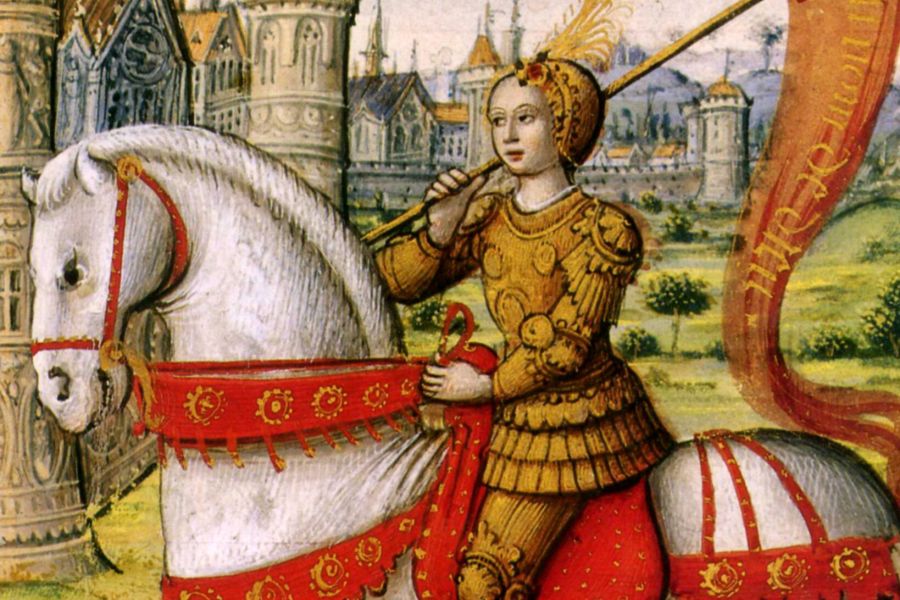Don’t Be Afraid — ‘Joan Up’
We must ask God for the gift of fortitude, for we know that the victory has already been won.

Catholic women love a good sticker. Show us a pretty sticker with a delicate font, and maybe a floral wreath(!) surrounding a saint quote and we will eagerly snap it up to decorate our cars, refrigerators and water bottles, or pop it in the mail to our sisters and friends.
I’m exaggerating somewhat here, but only slightly. This penchant may seem like an easily mocked quirk of Catholic women, but for many of us, these little visual reminders are just that — reminders of our faith intended to inspire us as we move through our day. A St. Thérèse quote on our laptop may remind us to ask the Little Flower for her intercession as we work to hit that deadline or draft a difficult email. The window decal embossed with St. Teresa of Calcutta’s gentle reminder to wash the dishes because we love each other may stop the grumbling over what seems a thankless task.
There is one sticker that is now making the rounds as various Catholic companies and artists offer discounts in honor of the Maid of Orléans’ feast day on May 30. The patterns and styles vary, but the words featured are always the same: “Joan Up.”
In the context of this brave martyr’s life and death, “Joan Up” is a call to battle. It is an invitation to accept without flinching the task that God has placed before us. An invitation no one answered better than Joan herself. One of her fellow soldiers, Jean de Metz, later recorded that Joan had said to him of her great commission to save France: “Although I would rather have remained spinning [wool] at my mother’s side ... yet must I go and must I do this thing, for my Lord wills that I do so.”
Joan was an illiterate country girl. She was only 17 years old when she went to war, knowing neither how to fight nor ride. But what she had in spades was faith and complete trust in God’s will for her life. Upon her arrival at the court of Charles VII, the dauphin of France, noblemen and theologians far older than Joan sought to confuse and manipulate her to test her credibility. She saw through their traps and impressed them with her piety, virtue and clarity of thought. Two years later, when she faced a hostile kangaroo court designed to condemn her to the stake, her humble and forthright manner often stupefied her accusers. According to the records of the trial, her questioners asked her if she was “in God’s grace.” It was a trap since a positive answer would be heretical (no one could claim surety of being “in grace”) and a negative would confirm that her voices were not divine. Joan calmly replied: “If I am not, may God put me there; and if I am, may God so keep me,” neatly sidestepping the trap they had laid.
Joan’s virtue and faith could not save her life in the end. On May 30, 1431, she was convicted by a secular court and burned at the stake for heresy. As the flames consumed her, she cried out for a crucifix, and two French priests held one before her. After Joan’s ashes had been thrown into the Seine, her executioner remarked that he now feared he would be damned for his role in the maiden’s death.
Nearly 600 years after her life, we honor her bravery and venerate her as a saint, and we remind ourselves to “Joan Up.” Yet we must be wary of seeing this imperative and thinking immediately of the shining Maid of Orléans, bearing her standard and leading armies into battle. We should think instead of the starved and chained prisoner, abandoned by her king and her country. Joan’s true courage came not when she besieged cities, but when she languished alone and humiliated in prison, and most especially in those final moments as cruel hands tied her to a stake and she died in agony, calling upon the name of Jesus.
I wish to “Joan Up” could always mean to plunge ahead, confident in God’s plan and his call to us —and in some cases, it may. But we cannot forget that in other moments of our lives, it will mean to cling to the cross, defeated and broken, trusting in his promise that our suffering will be redeemed.
This May 30, let us all “Joan Up” and remember that we were created to be fearless — not because we are foolhardy or because we expect victory here on earth, but because we know who is the true author of our lives, and we know that the victory has already been won.
St. Joan of Arc, pray for us!
- Keywords:
- st. joan of arc
- courage
- fortitude
















